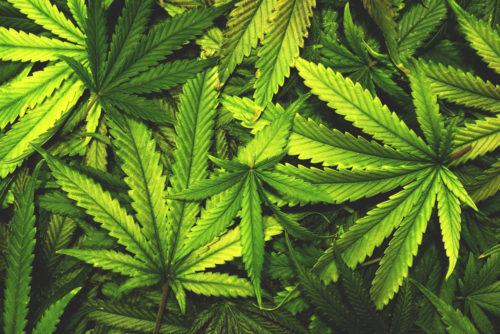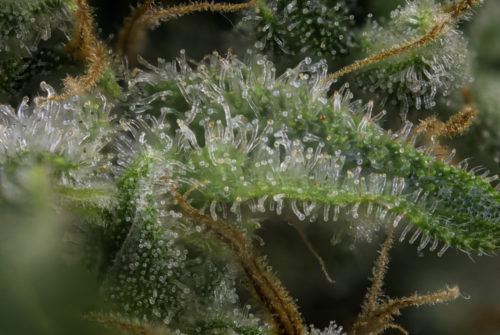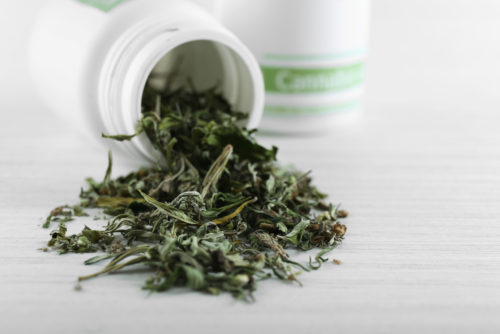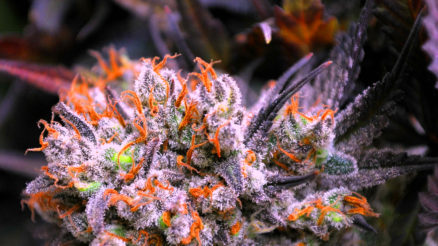CBD vs. THC: Everything You Need To Know About These Beneficial Cannabinoids

“Ladies and gentlemen…let’s get ready to rumble! In the blue corner, weighing in at an impressive five syllables, help me welcome the medical marvel, Cannabidiol, a.k.a. CBD! And in the red corner, weighing in at a truly tongue-twisting eight syllables, give a warm round of applause for the psychoactive samurai, Tetrahydrocannabinol, a.k.a. THC!”
With a title like CBD vs. THC, that’s what you might expect from this article — a fight. You likely assume that we’ll provide an answer to the question, “Which one is better?”
But, as you’ll see as you read on, pitting CBD against THC is like pitting an apple against an orange.
CBD and THC each have their own unique benefits, but one isn’t necessarily better than the other. There’s no clear winner like there would be if we compared, say, an apple and high-fructose corn syrup.
So let’s consider this less of a “versus” situation and more of a “getting to know you” event, where we delve into the specifics of both CBD and THC. Along the way, we’ll learn about the broad category of cannabinoids from which CBD and THC originate.
We’ll also discover where you can find CBD and THC. And we’ll investigate the effects and side-effects of CBD and THC to see how they compare.
To finish up our discussion, we’ll talk briefly about the entourage effect and see how CBD and THC work together to do more than they can do apart.
What Are Cannabinoids?

At its most basic, a cannabinoid is a chemical compound much like water, sugar, and salt. Cannabinoids, though, do something that none of the more common chemical compounds can: they interact with the cannabinoid receptors in your brain (CB1 and CB2).
That’s right — there are certain parts of your brain that are specifically formed to deal with cannabinoids and nothing else.
And here’s another interesting fact about cannabinoids: your body produces them in trace amounts. Granted, that amount is extremely low, but it goes to show just how integral cannabinoids are to the human body.
There are three distinct categories of cannabinoids that describe their origin:
- Endocannabinoids (those produced by the body)
- Phytocannabinoids (those produced by plants)
- Synthetic cannabinoids (those manufactured in a lab)
Regardless of where they originate or how they’re produced, cannabinoids are what give marijuana its appeal. These unique chemical compounds are the things that get you high, take the edge off anxiety, and minimize the occurrence of seizures.
For the rest of this article, we’ll be focusing our attention on the plant-based phytocannabinoids, since that’s where the bulk of the psychoactive and medical benefits come from.
But before we do that, let’s take a step sideways and talk about pronunciation for a moment.
How Do You Pronounce The Canna-Based Words?
There’s a huge debate raging about the correct way to pronounce such words as:
- Cannabinoid
- Cannabinol
- Cannabidiol
And pretty much every other word that starts with “canna.” That’s because multisyllabic words like cannabinoid can have their primary stress placed at different spots within the word.
For example, you could pronounce it CAN-uh-bih-noid, or you could pronounce it cuh-NAH-bih-noid. The same general idea goes for cannabinol: it could be CAN-uh-bih-nol, or it could be cuh-NAH-bih-nol.
Seems consistent, right?
Confusion creeps in, though, when you get to words like cannabidiol. You can’t use the latter pronunciation method (with the stress on the second syllable) because the main stress in the word actually occurs on the third syllable — the BIH, in this case — and two stressed syllables right next to each other simply doesn’t work.
So really, the only way to pronounce cannabidiol is can-uh-BIH-dee-ol. And that’s why there’s so much debate.
As for those of us at Honest Marijuana, we tend to hold to a more logical explanation for the way we pronounce these words. How would you pronounce the word cannabis, for instance?
You wouldn’t say cuh-NAH-bis, would you? People would probably look at you funny if you did. No, you’d say CAN-uh-bis. And, indeed, every other canna-based word can be pronounced with that same basic stress:
- Cannabidiolic (CAN-uh-bih-dee-ol-ic)
- Cannabigerolic (CAN-uh-bih-jer-ol-ic)
- Cannabichromenate (CAN-uh-bye-chro-meh-nate)
- Cannabichromene (CAN-uh-bye-chro-mean)
So for consistency’s sake, we’ll stick with the stress on the first syllable. Now that we’ve got that out of the way, let’s get to know the two most popular CAN-uh-bih-noids a bit better.
What Is THC?

Source: Herb.co
THC’s full name is Δ9-tetrahydrocannabinol. For those of you unfamiliar with scientific symbols, it’s pronounced “delta 9 tetrahydrocannabinol.”
Now you know why everyone just refers to it as THC. Despite the long name, THC is the most well-known cannabinoid, mainly for the reasons mentioned below.
THC is the primary psychoactive ingredient in marijuana and the reason why smoking a doobie will alter your consciousness. But THC does more than just take you on a nice trip.
It also reduces nausea, suppresses muscle spasm, relieves pain, and stimulates appetite, just to name a few.
What is CBD?

Source: Zamnesia.com
CBD’s full name is cannabidiol (pronounced CAN-uh-BIH-dee-ol), and it’s likely the second most well-known cannabinoid. THC takes the prize for notoriety simply because it’s extremely psychoactive, but CBD has gained ground in recent years thanks to the ever-growing list of medical benefits it offers.
CBD differs from THC in one major way: CBD is non-psychotropic. It won’t directly alter your consciousness, mood, or perception.
And while that may disqualify CBD as a major player in many people’s minds, we recommend that they give it another look.
CBD is packed full of some important medicinal effects, including:
- Pain relief
- Anxiety relief
- Inflammation reduction
- Psychosis relief
- Appetite stimulation
- Nausea reduction
- Seizure/convulsion reduction
- Nervous system degeneration prevention
- Muscle spasm suppression
- Blood sugar management
- Psoriasis treatment
- Inhibited cancerous cell growth
- Reduced risk of artery blockage
- Increased bone growth
- Killing or slowing of bacterial growth
That’s a lot of benefits from a simple molecule! It’s easy to see why CBD has become more popular in recent years, especially among those who want medical benefits without the psychoactive effects.
Where Can You Find CBD Vs. THC?
You can find both CBD and THC in the cannabis plant. There are three species of this plant:
- Indica
- Sativa
- Ruderalis
Each of the three species (and the different strains within those species) contains varied percentages of CBD and THC.
Growers have bred strains over the years that maximize THC content and CBD content. Bruce Banner #3, for example, tops out at a whopping 29 percent THC. Charlotte’s Web, on the other hand, was bred for its high CBD percentage and medicinal uses.
You may be wondering, “What about hemp? Can you get CBD and THC from that source?” Yes, you can, but hemp comes from the plants of the Cannabis sativa strain that contain extremely low amounts of THC (0.3 percent).
Additionally, the CBD in hemp is not all that high when compared to other medical strains. Hemp is mostly used in industrial applications, but its seed and oil can also be used as food.
Effects Of CBD Vs. THC

We’ve already touched on some of the effects that both CBD and THC offer. The primary difference between the two lies in THC’s ability to alter your perception (its psychoactive effects).
THC does produce some medical benefits, but the true medicinal powerhouse is CBD.
If we had to draw a line between the two cannabinoids, that’s where we would put it: CBD is medicinal, THC psychotropic. There are areas of overlap, but that’s the biggest difference.
That’s not to say that THC is only good for getting high. It does, in fact, have some important medical benefits, including its ability to:
- Relieve pain
- Reduce nausea and vomiting
- Promote sleep
- Treat post-traumatic stress disorder
- Increase appetite
- Decrease inflammation
- Promote relaxation
- Prevent convulsions
These medical benefits are often overshadowed by the psychedelic effects that are a major part of the THC experience.
If you take a THC product (even one with a low percentage) to achieve those medicinal effects, you’re going to feel some sort of altered perception. That can throw a major monkey wrench in your daily schedule.
So if you’re looking for relief from a medical issue but you don’t want to deal with being high at work (or generally out in public), CBD products are the better option.
Side Effects Of CBD Vs. THC
The side effects of CBD are minimal to non-existent. Some people have reported dry mouth when using CBD products, but on the scale of side effects — and when compared to the benefits CBD has to offer — it’s a small price to pay.
Another side effect of note has to do with CBD’s interaction with other medications. CBD inhibits your liver’s ability to break down most of the pharmaceuticals that humans take. That isn’t really a problem if you stop one medication and take CBD instead.
But if you’re taking a medication for a condition like high blood pressure or heart arrhythmia (which CBD doesn’t treat), adding CBD into the mix can render those other medications ineffective. That can cause serious problems.
To avoid these complications, be sure to talk to your doctor before using a CBD product.
THC, on the other hand, is well known for causing anxiety and paranoia. And because certain strains have pushed THC percentages higher and reduced CBD percentages, that anxiety and paranoia is only going to increase.
“Why is that the case?” you ask. Because of something called the entourage effect.
The Entourage Effect
The entourage effect is the interaction of cannabis compounds (e.g., THC, CBD, terpenes, etc.) to produce certain physical effects. The entourage effect is so vital in creating these physical effects that some are impossible without it.
For example, THC is a great treatment for chronic pain, while CBD helps mitigate the symptoms of psychosis.
You can’t substitute THC for CBD and expect to find relief from psychotic disorders. The two are not interchangeable in this regard. And while THC and CBD can be used to treat some of the same things, the specific, unique effects mentioned above can only be gained by using one or the other.
But put them together and suddenly you have a wide variety of new treatments and effects available. For example, the combination of THC, CBD, terpenes, and other cannabis compounds makes the treatment of depression, OCD, arthritis, and migraines possible.
The cannabinoids and terpenes by themselves don’t result in these same effects. It’s their combination that produces what’s technically known as synergy.
Synergy is the interaction or cooperation of two or more organizations, substances, or other agents to produce a combined effect greater than the sum of their separate effects. The example above is but one illustration of marijuana’s synergistic effects in action.
Isolate one component — like CBD — or push one component too high — like THC — at the expense of the other components, and the beneficial effects quickly decrease.
Try Them Both And Decide For Yourself
So now you know enough to make your own decision about the CBD-versus-THC question. Try not to think of it as a one-is-better-than-the-other situation. Rather, use them both for the different effects they provide.
Talk to the budtenders at your local dispensary, try different products (both CBD and THC), and find what works best for you. That way, you can enjoy a lifetime of cannabis benefits.
For more information on all things marijuana and to check out our Honest Blunts, concentrates, and 100% organic flowers, visit Honest Marijuana today.
The post CBD vs. THC: Everything You Need To Know About These Beneficial Cannabinoids appeared first on Honest Marijuana.
>View original article
Author: Anthony Franciosi



